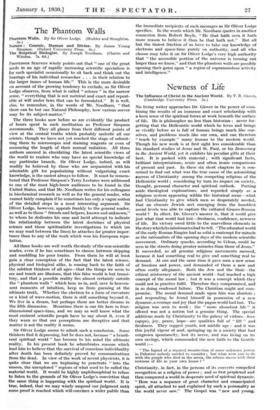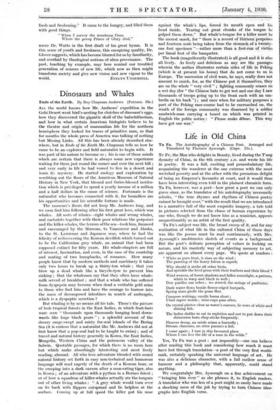Newness of Life
The Influence of Christ in the Ancient World. By T. R. Glover, {Cambridge University Press. as.) No living writer approaches Dr. Glover in the power of com- bining the results of an immense and exact scholarship with a keen sense of the spiritual forces at work beneath the surface of life. He is philosopher no less than historian : never for- getting that the Hellenistic world which he loves and brings so vividly before us is full of human beings much like our- selves, and problems much like our own, and can therefore "teach by example" many lessons to the modern world. Though his new work is at first sight less considerable than his standard studies of Jesus and St. Paul, or his Democracy in the Ancient World, yet it exhibits his peculiar gifts at their
best. It is packed with material ; with significant facts, brilliant interpretations, acute and often ironic comparisons of present and past. In these six short chapters he is con- cerned to find out what was the true cause of the astonishing success of Christianity among the competing religions of the Hellenistic world ; considering by turn its impact on society, thought, personal character and spiritual outlook. Putting aside theological explanations, and regarded simply as a religious system appearing within the historical scene—what had Christianity to give which men so desperately needed,
that an obscure Jewish sect emerging from the humblest social levels was able to capture the cultured Graeco-Roman world ? In effect, Dr. Glover's answer is, that it could give
just what that world had lost—freshness, confidence, newness of life. Its victory owed little to the marvellous elements in the storywhicli its missionaries had to tell. "The educated world of the early Roman Empire had as solid a contempt for miracle as the rationalists of the opening days of the modern scientific movement. Ordinary quacks, according to Celsus, could be seen in the streets doing greater miracles than those of Jesus."
It succeeded, as all genuine religious movements succeed,
because it had something real to give and something real to demand. At one and the same time it gave men a new sense of freedom and power, and demanded of them a new and often costly allegiance. Both the Jew and the Stoic—the ethical aristocracy of the ancient world—had reached a high
concept of the moral law ; but it was a concept which they could not in practice fulfil. Therefore they compromised, and in so doing confessed failure. The Christian might not com- promise. The moral demand made upon him was absolute ; and responding, he found himself in possession of a new dynamic, a courage and joy that the pagan world had lost. The religion was seen to work ; the "more abundant life" it offered was not a notion but a genuine thing. The special
additions made by Christianity to the galaxy of virtues—love (agape), joy, peace, hope—are qualities full of " lift " and freshness. They suggest youth, not middle age : and it was
this joyful vigour of soul, springing up in a society that had outgrown spontaneity, lost its nerve, and was living on its own savings, which commended the new faith to the Gentile world :—
"The legend of a reputed resurrection of some unknown person in Palestine nobody needed to consider ; but what were you to do with the people who died in the arena, the reborn slaves with their newness of life in your own house ? "
Christianity, in fact, in the persons of its converts compelled recognition as a religion of power ; and so first perplexed and then conquered a world in desperate need of spiritual dynamic.
"Here was a sequence of great character and emancipated spirit, all attached to and explained by such a personality as the world never saw." The Gospel was "new and. young, fresh and freshening." It came to the hungry, and filled them with good things,
"When I survey the wondrous Cross Where the young Prince of Glory died,"'
wrote Dr. Watts in the first draft of his great hymn. It is this sense of youth and freshness, this energizing quality, Dr.
Glover suggests, which has become blurred for us by familiarity, and overlaid by theological notions of alien provenance. The past, teaching by example, may here remind our troubled generation of sources of new life, which now as then might
transform society and give new vision and new vigour to the











































 Previous page
Previous page